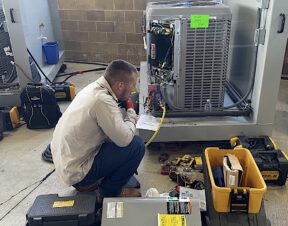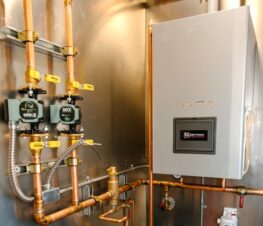Dain Hansen is vice president of Government Relations, The IAPMO Group. He lends his frequent perspective of Capitol Hill, and the plumbing industry.
Here is an edited version of his update from November 21:
Uphill Battle for Tax Credit. Supporters of the renewable production tax credit (PTC) are recognizing that they now face an uphill battle to keep the tax credit as the political landscape in DC continues to evolve and when the Republicans control both chambers in the next Congress. Earlier this week, House Ways and Means member Pat Tiberi (R-Ohio) is quoted as saying that President Barack Obama’s immigration push may also make it harder for conservatives to swallow a two-year extension of the renewable production tax credit. “I think that our guys are going to be so upset,” he said. In the Senate, Sen. John Thune (R-S.D.)remains hopeful that an effort to overhaul the tax code can gain momentum next year and provide a platform for members who want to change temporary tax provisions like the PTC. But he acknowledged that newly-elected Republicans who want to advance fiscally conservative policies will make it more difficult to keep the credit, especially in its current form. “As this debate wears on, newer Republicans get elected who don’t represent wind states,” Thune said. “Politically, it’s getting harder to sustain the current tax treatment, so that’s why I think we got to come up with a gradual, phased transition plan, but one that provides certainty so that people aren’t left just twisting in the wind, so to speak.”
New Internet Taxes? Supporters of the Marketplace Fairness Act (MFA), which would give states the authority to collect sales tax from out-of-state online retailers, hope to pass the MFA into law before year’s end but face long odds. House Speaker John Boehner (R-OH) opposes the Senate-passed MFA and will only schedule a vote on the measure if it is substantially revised. MFA proponents hoped to attach the legislation to a more popular bill that will extend the current prohibition on Internet access taxes. The House has previously passed the “Internet Tax Freedom Act” (ITFA) to permanently extend the moratorium protecting Internet access, but the moratorium expires on December 11. We expect Congress to pass a version of ITFA between the upcoming holidays without the MFA attached to it.
Around the Industry
City facing Challenges Implementing Backflow Rule. Chippewa Falls has work to do to bring city homes and businesses in line with a state regulation regarding plumbing systems. In late September, the city received an official notice of non-compliance with the state-wide Cross Connection Control Program from the Wisconsin Department of Natural Resources. The cross connection program mandates the city periodically inspects every home and business to ensure that connections between plumbing lines that have drinkable and non-drinkable water are properly fitted with a backflow prevention device. That device ensures that waste water doesn’t contaminate drinking water when there’s a loss of pressure in the city’s water system. The city had been aware that the DNR was starting to push municipalities to update compliance since last November. The city approved the Comprehensive Cross Connection Control Program in January. For the program, the city is teaming with Hydrodesigns, a consulting company out of New Berlin, to bring Chippewa Falls up to code on an ordinance that has been on the books since 1986. Part of the cross connection agreement with Hydrodesigns was for that company to carry out the inspections of commercial and industrial properties. “We are on schedule there,” said Chippewa Falls Director of Public Works Rick Rubenzer. “It’s the residential properties that the city is behind on.” One option to get inspections back on schedule would be to add residential inspections to Hydrodesigns’ contract. Hiring another employee to help do the work would be another option for the city. While the policy to have backflow prevention devices installed isn’t new, the DNR wants municipalities to provide an updated ordinance. The new ordinance would be similar to the old one, though it establishes a timeframe that businesses and homeowners who are found to be in violation of the ordinance to install proper devices to their plumbing.
Heated Driveways Growing in Popularity. As parts of the country dig out from major snow storms this week, one industry is seeing the value of their services rising in the public’s eye. “It’s becoming more and more popular because of an aging population of boomers who are just tired of shoveling,” says Bryan Morris, director of sales for Warmzone, a company in Utah that designs and supplies radiant heat systems. “We sell a great deal to whomever gets snow.” David Veron, who owns The Veron Co., a landscape and design business in Marlborough, Massachusetts, sees the popularity of heated driveways as part of a larger trend: Homeowners are trying to build outdoor spaces they can use year-round. In addition to driveways, his customers are heating walkways that lead to amenities such as hot tubs and fire pits. “It’s nice to sit around those in the winter,” Veron says. “But if you have to shovel first, it’s too much of a chore.” Morris says the uptick in business started last winter: “People were calling us saying, ‘I can’t keep up.’ ” Interest persisted through the summer, since the warmer months are prime time for doing the work to install heated driveways. “It’s a classic example how you can’t put a price tag on peace of mind,” one homeowner who put in the heated driveway when his house was built in 2005 is quoted as saying in an local news article this week. “Given the climate of Chicago in the winter, it was really nice not to have to shovel.”




Join the conversation: